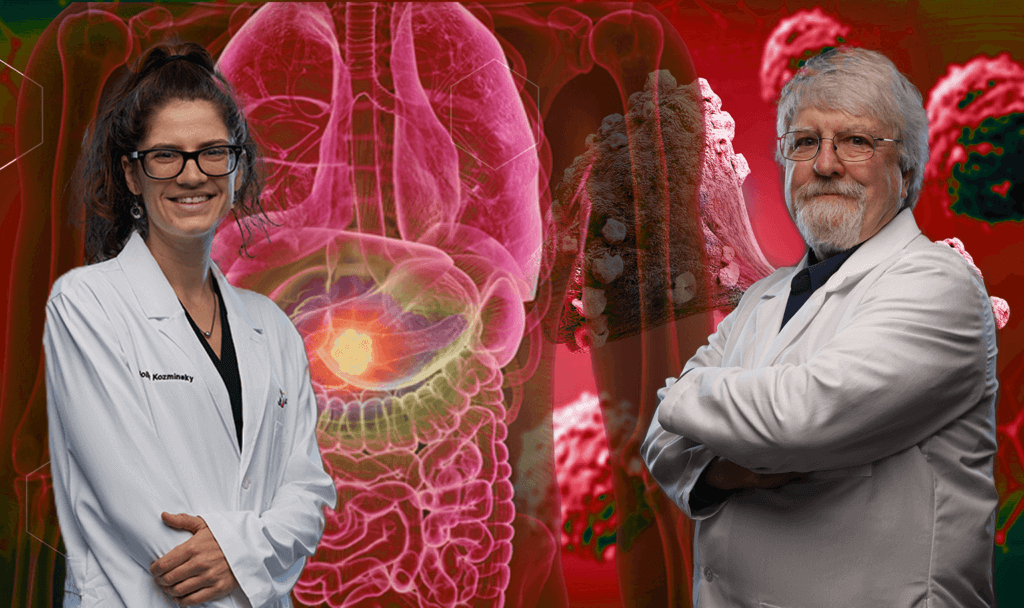Iowa State Researchers Receive 2023 Barry Award to Investigate Cellular Structure of Pancreatic Cancer Tumors, Improve Treatment Outcomes
Caitlin Ware, Iowa State University Office of the Vice President for Research
Posted Aug 23, 2023

A team of Iowa State University researchers has been selected to receive funding from the 2023 Margaret B. Barry Cancer Research Program to explore the cellular composition and organization of pancreatic cancer tumors in relation to treatment resistance.
Administered by the Iowa State University Office of the Vice President for Research (OVPR), the Barry award is given each year to faculty or professional and scientific (P&S) researchers to further cancer research. Assistant professor of chemical and biological engineering Molly Kozminsky and professor of veterinary microbiology and preventive medicine Michael Wannemuehler have been named the recipients of the annual award and will receive $120,000 in institutional funding over two years. The pair will use Barry award funding to pursue creation of technology that would allow for manipulation of the cellular structures associated with pancreatic cancer within a model system to study resistance to both the human immune system and targeted cancer therapies.
“Cancer touches every single one of us – either directly or indirectly – at some point in our lives, and pancreatic cancer is a particularly insidious form,” said Vice President for Research Peter Dorhout. “The novel research of Doctors Kozminsky and Wannemuehler offers the long-term potential to lessen the impact of pancreatic cancer. Our office is delighted and honored to annually administer the Margaret B. Barry Cancer Research Program Award that has been a critical tool for advancing cancer research at Iowa State University for nearly 20 years.”
Pancreatic cancer is especially deadly, with a five-year survival rate of only 11 percent. While delayed diagnosis due to generalized symptom presentation contributes to the low success rate of pancreatic cancer treatment, obstacles are also present in treatment itself due to what is known as the pancreatic tumor microenvironment (TME). The TME includes both the healthy environment that was present before the arrival of cancerous cells and the changes that occur once cancer begins to affect the body. The TME also directly impacts the ability of tumor cells to spread and resist suppression of both traditional medical treatments — including chemotherapy, antibody therapy, and immunotherapy — and the immune system itself. In the case of pancreatic cancer, tumor cells activate a different group of tissue cells (known as cancer-associated fibroblasts and macrophages) that limit the ability of therapeutics to diffuse throughout the tumor, while simultaneously exhausting and suppressing immune cells attempting to combat the cancer.
To improve the success rate of pancreatic cancer treatments, PI Kozminsky and Co-PI Wannemuehler believe that it is crucial to identify which cells are present, and in what ratios, within the disease’s TME. Through their Barry project, titled “Dissecting contributions to the immunosuppressive tumor microenvironment in pancreatic cancer using novel in vitro systems,” the team plans to apply state-of-the-art engineering techniques and a process called DNA-directed patterning to develop a platform that will support investigation into the pancreatic TME and what makes it impenetrable to critical cells that fight cancer.
“I’ve been pursuing cancer research since I was a graduate student, and the challenges that we see in clinic settings and the complexities of cancer are areas I want to address,” said Kozminsky. “There are many researchers who are looking at this disease from a number of different angles. As a chemical engineer, I am interested in how we can improve cancer therapeutics and guide how we administer treatment.”
By using an in vitro model that can be studied without animal models, Kozminsky and Wannemuehler will be able to analyze a variety of cells known to both resist and assist with cancer treatment. The cells will have the capacity to be arranged in a manner that mimics the human body — even down to specific tissue types — in order to determine what makes a tumor more or less resistant to therapies.
The results from Kozminsky and Wannemuehler’s Barry-funded project are expected to inform novel strategies for cancer treatments. Preliminary data generated from this research will also be of interest to private foundations, including the American Cancer Society and the National Pancreas Foundation, and may also pave the way for future funding opportunities with federal agencies such as the National Institutes of Health (NIH).
The Margaret B. Barry Cancer Research Program award, established in 2005 with an estate gift from Margaret Barry, is open to all eligible Iowa State University faculty and P&S researchers (meeting the family/profile for PI eligible criteria) in the College of Veterinary Medicine. More information about the application, review, and award process can be found here.
